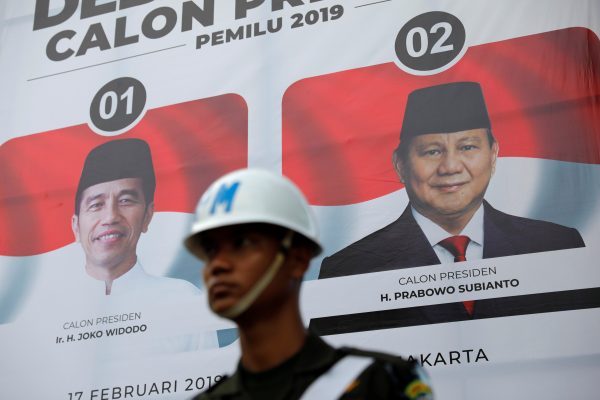Jokowi’s popularity in South Sulawesi has plunged significantly since the 2014 presidential election, when he secured a hefty 71 per cent of votes from the province. There are two possible factors for this decline in support: the former vice president Jusuf Kalla’s endorsement of Jokowi and Prabowo’s popularity among conservative Muslims in the province.
Having Kalla as his running mate in 2014 provided Jokowi with a coattail effect that aided his sweep of South Sulawesi during the presidential election that year. Born and raised in South Sulawesi, Kalla’s networks and stature there certainly helped to garner support. Notably, as a successful entrepreneur and a pious Muslim, Kalla is seen as a representative leader of eastern Indonesia.
Influential within the former ruling Golkar Party — chairing the youth division of the Makassar branch in the 1960s and entering parliament as the regional representative for South Sulawesi from 1980s to 1990s — Kalla’s association provided Jokowi with significant grassroots support in 2014. Kalla is also a prominent businessman, especially in South Sulawesi due to his late father’s strong business networks there.
In this year’s presidential election, Kalla has publicly endorsed Jokowi. But Kalla himself faces challenges that weaken his endorsement, even in his home province.
In the 2018 regional elections, the mayoral candidate of Kalla’s choice, Munafri Arifuddin, dramatically lost out to his only opponent: a blank box. The reason behind this defeat is growing discontent towards local elites affiliated with Kalla’s old business and political cliques. A former mayor of Makassar affiliated with Kalla’s brother-in-law is suspected of having benefitted from a corruption case in a water system installation project. The discontent towards local elites endorsed by Kalla means that Kalla can no longer be counted on to help secure votes for Jokowi in South Sulawesi.
Prabowo, on the other hand, is receiving strong support from at least two constituencies: Islamic groups and the grassroots of South Sulawesi.
Islamic organisations in South Sulawesi — including Muhammadiyah, the Nahdlatul Ulama-affiliated Darud Da’wah wal Irsyad, Wahdah Islamiyah and Darul Istiqamah — focus on candidates’ Islamic credentials. They believe that Prabowo has been less detrimental (mudarat) to society than Jokowi, blaming the President for the current inflation over goods and services due to his emphasis on infrastructure projects. They criticise Jokowi as being a weak president and a ‘puppet’, easily influenced by his team.
These Islamic groups are also unhappy over Ma’ruf Amin’s appointment as Jokowi’s vice-presidential candidate. They believe Ma’ruf lacks credibility and was appointed solely to garner Muslim votes.
Conversely, the groups see Prabowo as a more decisive leader due to his military background. The recommendation of Ijtima Ulama I and II — two gatherings of conservative Muslim preachers and activists aligning themselves with Prabowo — also boosts his perceived leadership credential.
These Islamic groups were paramount in attracting mass grassroots support during the #2019ChangePresident or #2019GantiPresiden movement in Makassar. The movement established a united front among activists at both the national and local levels campaigning against Jokowi — a leader perceived to be an enemy of conservative ulamas (Islamic scholars) yet unable to curb inflation. These circumstances suggest identity politics is an important factor to look out for in South Sulawesi in the run-up to the 2019 presidential election.
For his part, Jokowi has established an elite network in South Sulawesi to complement Kalla’s support. Jokowi enjoys a close relationship with the newly elected South Sulawesi Governor Nurdin Abdullah, while former governor Syahrul Yasin Limpo has also publicly endorsed Jokowi.
Whether the presence of a handful of influential politicians can help tilt support in favour of Jokowi remains to be seen. Nurdin Abdullah risks declining popularity if he were to openly encourage supporters to vote for Jokowi. His electoral success was partly due to the number of conservative Islamic voters who support his running mate, Andi Sudirman Sulaiman, who has a strong Islamist background. Syahrul Yasin Limpo is also likely to face rising discontent after failing to complete a few infrastructure projects during his term, making him less able to bring in political support for Jokowi.
Rather than relying on elite networks locally, Jokowi should step up political campaigning to improve his image in South Sulawesi. Well-coordinated political parties actively campaigning for him in South Sulawesi will provide Jokowi with an electoral boost at the grassroots level. Without their support, Jokowi will have a slim chance of securing a victory in South Sulawesi — the most important province in the entirety of Sulawesi. It is the seventh most-populated province in the country with the largest number of voters in eastern Indonesia.
Winning in South Sulawesi would provide an advantage for those running for the presidency. Circumstances suggest Jokowi may not be that winner in South Sulawesi.
Dedi Dinarto is a Research Associate with the Indonesia Programme, S Rajaratnam School of International Studies (RSIS), Nanyang Technological University (NTU), Singapore. This is part of the RSIS Series on the 2019 Indonesian presidential election.
A version of this article originally appeared here on RSIS.

